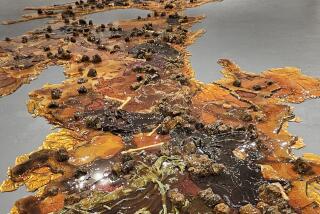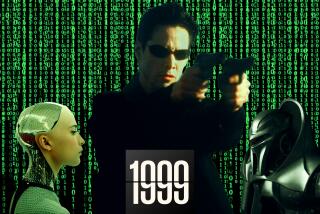Review: âAi Weiwei: Never Sorryâ reveals authentic artist at work
WatchingâAi Weiwei: Never Sorryâis like experiencing a thrilling unfinished symphony: The story is enthralling, but itâs not over, and thereâs no telling where itâs going. Which makes what we see on screen all the more involving.
Though he was named the most powerful artist in the world by ArtReview, Chinese provocateur/human rights activist Ai is simply a boldface name to most people, someone whose life and significance we are only vaguely aware of. Alison Klaymanâs documentary, a Sundance award winner, definitively changes that.
A journalist based in Beijing, Klayman more or less stumbled on Ai and his story but ended up filming for two years, forging a personal connection and getting exceptional access to the artist and those closest to him. Her film reveals him to be a man of piercing intelligence, charisma and fortitude who becomes increasingly impressive the more we find out about him.
Ai sprung onto the world scene as a conceptual artist who helped design the Birdâs Nest stadium for the Beijing Olympics in 2008 and then announced he was boycotting the Games because of what he saw as dictatorial government policies. He is, as a fellow artist says, ânot the kind of person we are familiar with in China. He doesnât work within the system. Heâs just himself.â
Being just himself has recently gotten Ai into extraordinary trouble with the Chinese regime. He was held incommunicado for 81 days last year under conditions that verged on psychological torture and was released only to be charged with tax evasion and fined $2.4 million in unpaid taxes and penalties, a sentence that was upheld just a few weeks ago.
âI am now more of a chess player than an artist, waiting for my opponent to make the next move,â Ai says. Still, he refuses to back down. âIf we donât push, nothing happens. Life is more interesting when you make a little effort.â
The Chinese government has gotten tough on Ai because social media, first a blog and then a Twitter stream (@aiww), has made his presence and his thoughts ubiquitous in China and beyond. âThe Internet is the greatest invention of the 20th century,â he says. âIt allows ordinary people a chance to change public opinion.â
Ai first became well known in China in the aftermath of the devastating 2008 earthquake in Sichuan province in which thousands of children died as a result of flimsy construction in state-built schools. The Chinese government refused to release specifics about the students who died, leading Ai to start the Sichuan Earthquake Names Project, which collected more than 5,000 names of victims.
Ai further memorialized the young people in a museum show in Munich, where he used 9,000 backpacks to spell out a one-sentence tribute to the students. As Evan Osnos, the New Yorkerâs China correspondent explains in the film, the issue of transparency, of what should be made public, is one of Aiâs key issues. That stand has gotten Ai into all kinds of dire situations, including being beaten in a hotel room by police, an act we can hear on a tape the artist made. Compelled as always to push back, Ai files lawsuit after lawsuit against the government, because he believes the exercise will be as revealing as it is futile. âWe want them,â he says of his countryâs officialdom, âto show their actual face.â
One thing Klaymanâs thorough reporting reveals is the likely influence of Aiâs late father, the respected poet Ai Qing, on his son. A passionate idealist who risked his life to support the Communist Party, the elder Ai ran afoul of the state during the Cultural Revolution and endured years of exile, beatings and humiliation. âIt is an experience I cannot erase,â the younger Ai says.
Another formative influence was the 12-year period, starting in 1983, Ai lived and worked in New York City. He developed a passion for pastrami sandwiches â we see him stockpiling them during a visit to the Carnegie Deli â and for democracy. âOnce you experience freedom,â he says quietly, âIt stays in your heart. No one can take it away.â
All the time Klayman put in with Ai also leads to privileged glimpses of the private man, including conversations with his wife and fellow artist, Lu Qing, and glimpses of his life with a young son he had with another woman.
Perhaps most touching is an interchange with his mother, Gao Ying, who worries that her son âwants to solve the problems of the whole country.â His response is a fatalistic âif they want to get me, they will.â He is not fearless, he elaborates at another point, but quite fearful. âThe danger is really there,â he says, âbut the danger is stronger if you donât act.â Ai walks that walk every day, and thatâs what makes him, and this film, so impressive.
More to Read
The biggest entertainment stories
Get our big stories about Hollywood, film, television, music, arts, culture and more right in your inbox as soon as they publish.
You may occasionally receive promotional content from the Los Angeles Times.











